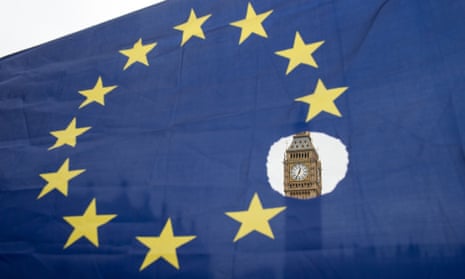David Davis has described elements of his job leading the UK out of the EU as “making landing on the moon look simple”. My successor as cabinet secretary and head of the civil service, Sir Jeremy Heywood, has described Brexit as “the most complex challenge the civil service has faced in our peacetime history”. And now the head of the National Audit Office (NAO), Amyas Morse, has waded in to say that there is a risk of our preparations falling apart “like a chocolate orange”.
So how well prepared are we to reach a deal within the next 20 months?
Brexit was a complex challenge for a government with a clear majority and a “strong and stable” leader. It was not helped by prime minister May’s decision to placate her Brexit colleagues by putting them in key jobs and creating two new ministries. David Davis would have been better able to coordinate policy from the Cabinet Office. This structure would have stood a better chance of keeping the chocolate orange in one piece. I suspect it is too late to unscramble all this, even if there is a change of prime minister, as machinery of government changes are a distraction we can’t afford now.
In addition, the government now has to get detailed legislation through an unsympathetic House of Lords, and with a slender Commons majority that could evaporate at key moments. The EU has clear negotiating guidelines while it appears that cabinet members haven’t yet finished negotiating with each other, never mind the EU. Business leaders are frustrated as they are not convinced they are being heard, rather than simply being brought in to listen.
The “great repeal bill” is now recognised as a wonderful oxymoron: it involves repealing EU rules and rewriting them into UK law, and is only “great” in terms of its likely impact on the amount of regulation, which may well be increased substantially. This is not the government’s intention, but many in the Lords and the Commons see this as a perfect opportunity to expand regulation in areas like workers’ rights and animal welfare. It will also stretch the ability of a minority government to work with Scotland and Wales, who are already upset by the deal with the DUP. So how on earth, as a civil service, do you respond?
First, you bring in more resources – the Treasury has allocated over £400m for extra staff, and knows that much more will be needed. The Department for Exiting the European Union has over 450 staff, and even small departments like Defra have been given over 400 more staff to cope with the horrendously difficult issues of fishing, farming, environmental regulations and animal welfare. Let us hope that Michael Gove finds these new experts helpful.
It is sometimes forgotten that many of our civil servants have spent decades negotiating successfully to protect British interests in the EU. They are good at it. Of course, this has not involved trade deals, and that is why new staff are being hired with experience of making such deals. So the civil service is gearing up but it will only be effective if there is clear political leadership from above.
Second, you clear the decks: the Queen’s speech rightly concentrated on Brexit, and vast swaths of the Conservative manifesto will never see the light of day.
Third, you minimise the number of votes: that means legislation should be the last resort not the first.
Most importantly, we need to start being honest about the complexity of the challenge. We keep being told by our politicians that Brexit can be delivered easily. This isn’t correct. Believe me, we are embarking on a massive venture. There is no way all these changes will happen smoothly and absolutely no chance that all the details will be hammered out in 20 months.
We will need a long transition phase, and the time needed does not diminish by pretending that this phase is just about “implementing” agreed policies as they will not all be agreed. The NAO should be concentrating on the implementation issues: even after a deal has been reached, it will be extremely difficult to set up the IT systems and processes needed to reach practical solutions in the areas of immigration, customs and trade. Politicians need to learn from the universal credit saga, listen to officials and not over-promise on timings.
So fasten your seat belts, we are in for a rough ride. Fortunately, a recent study showed we have the fourth best civil service in the world, behind Canada, Australia and New Zealand. But ours is rated best for policy. It will need to be.
Gus O’Donnell is a former cabinet secretary and head of the civil service
